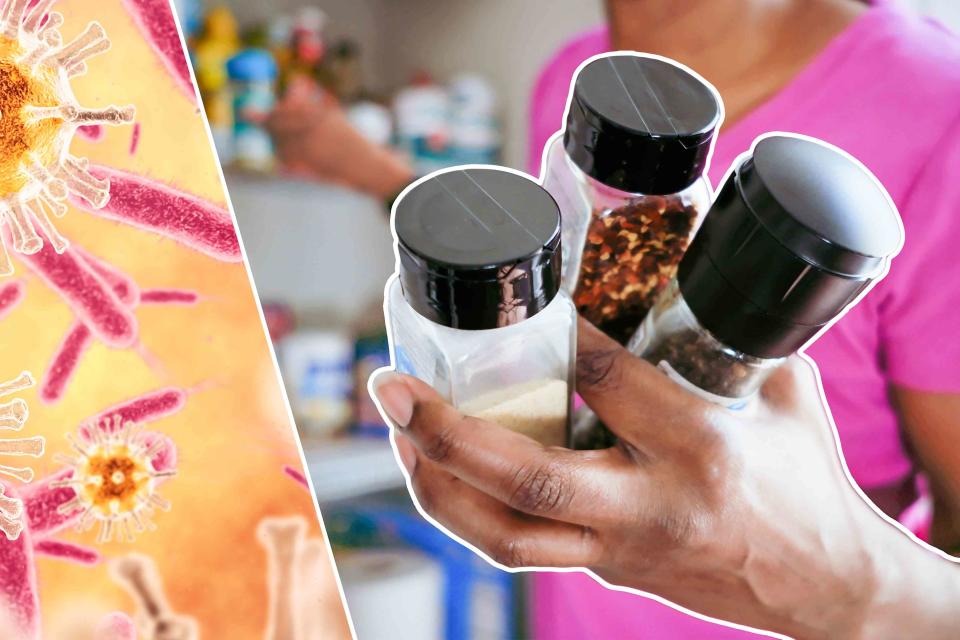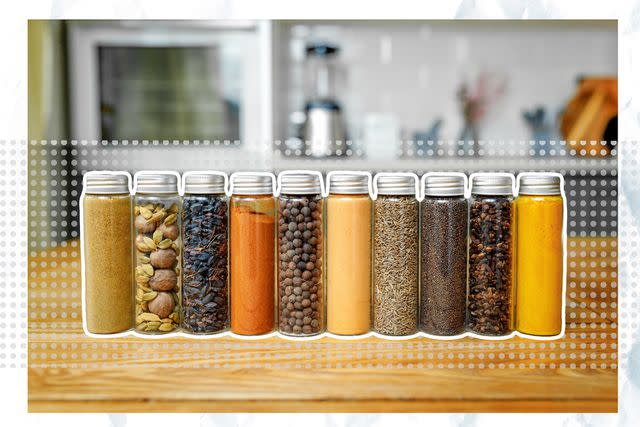The Germiest Place in Your Kitchen You Probably Aren’t Cleaning
It's not the sink, the fridge door handle, or the garbage bin.

Simply Recipes / Wanda Abraham
Did you know that 20 percent of foodborne illnesses are caused by contamination in home kitchens? That means one out of every five people who get sick from food poisoning caused by bacteria, viruses, parasites, and fungus made the food at home. A recent study published by Journal of Food Protection—it was funded by the USDA Food Safety and Inspection Service— revealed something even more enlightening.
You may be wiping down your kitchen counters and cleaning your sinks often, but there is one place in your kitchen that you probably aren’t even thinking about cleaning. And it’s not what you would think, like the refrigerator handle or garbage bin. According to the study, the germs that are most likely to cause a foodborne illness are lurking on your spice jars.
Here’s a quick recap of the study:
371 participants were asked to prepare raw turkey patties in their home kitchens. The researchers inoculated the raw turkey with a microorganism called MS2. After the patties were made, 12 areas of each kitchen were swabbed for cross contamination, looking for traces of MS2.
The highest concentration of cross-contaminated MS2 was found on spice containers. The study highlighted four reasons why:
The spice jars were set near the raw turkey patty.
The participants did not wash their hands between handling the raw turkey and seasoning the patties with the spices.
The spice jars were handled with contaminated hands multiple times.
The spice jars were not cleaned or sanitized after handling them.
The number one takeaway? Wash your hands, not just before and after preparing food, but during as well, especially when handling raw meat. Then, wipe down your spice jars before you put them away.

Simply Recipes / Wanda Abraham
How To Clean and Sanitize Your Spice Jars
As a general rule of thumb, wipe down your spice jars after you use them. I follow the recommendation by Benjamin Chapman, an author of the study, as he told The Washington Post: use a clean soapy cloth to wipe down each spice container and follow with a disinfectant. Here’s how:
Fill a bowl with warm soapy water—I use a drop or two of dish soap in about 2 cups of clean, warm water. Dip a clean dish towel into the soapy water and wring it out well. Wipe the spice jar, making sure to get every nook and cranny. Then, spray the jar with a disinfectant solution or wipe it down with a disinfectant wipe. If the spice jar is wet, dry it with a clean kitchen towel or paper towel.
Tips For Organizing and Buying Jarred Spices and Herbs
When to get rid of spices: You won’t get sick from eating old spices, but they lose their flavor, aroma, and vibrancy over time. Check the expiration date on the jar and compost expired ones. For jars without expiration dates, look at the color. If your parsley is more gray than green, for instance, toss it! Can’t tell by looking? Open the jar and smell. If the scent is faint or non-existent, toss it.
Store them in the right place: Be sure to store your spices in a cool dry place, never near or on the stove since heat breaks them down faster.
Label the spice jars: Label the jars with a Sharpie or a label maker. Whatever makes you happy. Organize them in a way that makes sense for you. I alphabetize mine, but you may want to organize them by how frequently you use them or by type of spice.
Buy only what you will use: Only buy the spices and herbs you use often and in quantities you know you will use up within six to 12 months, at most. It’s best to buy smaller jars, rather than getting bulk bags that will most likely expire before you use them.

